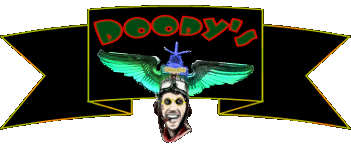|
June 20, 1924 - May 28, 1971
Most Decorated
World War II
Combat Soldier
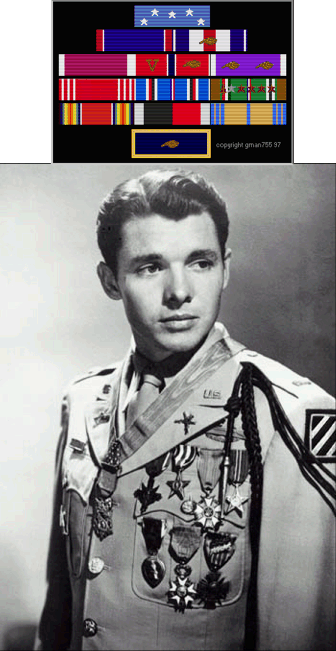
A Brief Biography
Audie Leon Murphy, son of poor Texas sharecroppers, rose to national fame as the most decorated U.S.
combat soldier of World War II. Among his 33 awards and decorations was the Medal of Honor, the highest military award for
bravery that can be given to any individual in the United States of America, for "conspicuous gallantry and intrepidity at
the risk of his life above and beyond the call of duty."
He also received every decoration for valor that his country had to offer, some of them more than once,
including 5 decorations by France and Belgium. Credited with either killing over 240 of the enemy while wounding and capturing
many others, he became a legend within the 3rd Infantry Division.
Beginning his service as an Army Private, Audie quickly rose to the enlisted rank of Staff Sergeant,
was given a "battle field" commission as 2nd Lieutenant, was wounded three times, fought in 9 major campaigns across the European
Theater, and survived the war.
During Murphy's 3 years active service as a combat soldier in World War II, Audie became one of the best
fighting combat soldiers of this or any other century. What Audie accomplished during this period is most significant and
probably will never be repeated by another soldier, given today's high-tech warfare. The U.S. Army has always declared that
there will never be another Audie Murphy.
On 21 September, 1945, Audie was released from the Army as an active member and reassigned to inactive
status. During this same time, actor James Cagney invited Murphy to Hollywood in September 1945, when he saw Murphy's photo
on the cover of Life Magazine.
The next couple of years in California were hard times for Audie Murphy. Struggling
and becoming disillusioned from lack of work while sleeping in a local gymnasium, he finally received token acting parts in
his first two films. His first starring role came in a 1949 released film by Allied Artists called, Bad Boy. In 1950 Murphy
eventually got a contract with Universal-International (later called Universal) where he starred in 26 films, 23 of them westerns
over the next 15 years.
His 1949 autobiography To Hell And Back was a best seller. Murphy starred as himself
in a film biography released by Universal-International in 1955 with the same title. The movie, To Hell and Back, held the
record as Universal's highest grossing picture until 1975 when it was finally surpassed by the movie Jaws.
In the mid-60s the studios switched from contract players to hiring actors on a picture-by-picture
basis. Consequently, when his contract expired in 1965 Universal did not renew. This gave him the opportunity to work with
other studios and independent film producers. In the 25 years that Audie spent in Hollywood, he made a total of 44 feature
films.
Despite his success in Hollywood, Audie never forgot his rural Texas roots. He returned frequently to
the Dallas area where he owned a small ranch for a while. He also had ranches in Perris, California and near Tucson, Arizona.
He was a successful Thoroughbred and Quarter Horse racehorse owner and breeder, having interests in such great horses as "Depth
Charge."
His films earned him close to 3 million dollars in 23 years as an actor. Audie loved to gamble,
and he bet on horses and different sporting events. He was also a great poker player. In his role as a prodigious gambler,
he won and lost fortunes.
Audie Murphy wrote some poetry and was quite successful as a songwriter. He usually teamed up with talented
artists and composers such as Guy Mitchell, Jimmy Bryant, Scott Turner, Coy Ziegler, or Terri Eddleman. Dozens of Audie Murphy's
songs were recorded and released by such great performers as Dean Martin, Eddy Arnold, Charley Pride, Jimmy Bryant, Porter
Waggoner, Jerry Wallace, Roy Clark, Harry Nilsson and many, many others.
His two biggest hits were Shutters and Boards and When the Wind Blows in Chicago. Eddy Arnold recorded
When the Wind Blows in Chicago for his 1993 album Last of the Love Song Singers which is currently in release by RCA.
Audie suffered from what is now known as Post Traumatic Stress Syndrome (PTS) and was plagued
by insomnia and depression. During the mid-60's he became dependent for a time on doctor prescribed sleeping pills called
Placidyl. When he recognized that he had become addicted to this prescription drug, he locked himself in a motel room, stopped
taking the sleeping pills and went through withdrawal symptoms for a week.
Always an advocate for the needs of veterans, he broke the taboo about discussing war related mental
problems after this experience. In a effort to draw attention to the problems of returning Korean and Vietnam War veterans,
Audie Murphy spoke-out candidly about his personal problems with PTS, then known as "Battle Fatigue". He publicly called for
United States government to give more consideration and study to the emotional impact war has on veterans and to extend health
care benefits to address PTS and other mental health problems of returning war vets.
While on a business trip on May 28, 1971, (Memorial Day Weekend) he was killed at the age of 46. A private
plane flying in fog and rain crashed in the side of a mountain near Roanoke, Virginia. Five others including the pilot were
also killed. Although Audie owned and flew his own plane earlier in his career at Hollywood, he was among the passengers that
tragic day.
On June 7th, Audie Murphy was buried with full military honors in Arlington National Cemetery.
His gravesite, near the Amphitheater, is second most visited gravesite year round. President Kennedy's grave is the most visited.
In 1996 the Texas Legislature officially designated his birthday, June 20th, as Audie Murphy Day.
|
|
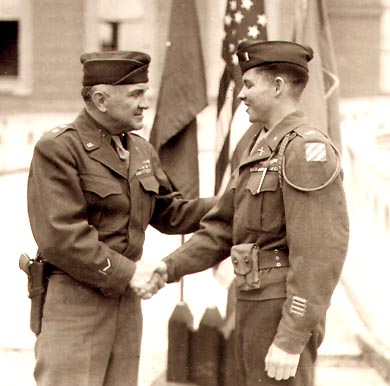
Major General John "Iron Mike O'Daniel presents
1st Lt. Audie L. Murphythe Distinguished Service Cross and Silver
Star Medals
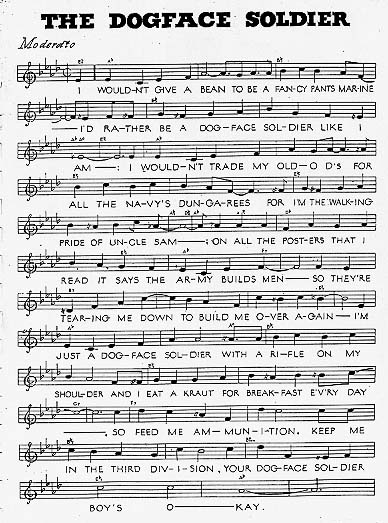
This is the original version of the 3rd Infantry Division song,' The Dogface Soldier'.
It is featured in the movie, "To Hell and Back", the story of Audie Murphy, the most decorated soldier of World War II. This
translation from World War II is not politically correct.
*Official
NarrativeFor Medal of Honor Recipient*
MURPHY, AUDIE L.
Rank and organization:
Second
Lieutenant, U.S. Army, Company B, 15th Infantry, 3d Infantry Division.
Place and date: Near Holtzwihr France,
26 January
1945
Entered service at: Dallas, Tex.
Birth: Hunt County, near Kingston, Tex.
G.O. No.65, 9 August 1945.
CITATION: 2d Lt. Murphy commanded
Company B, which was attacked by 6 tanks and waves of infantry. 2d Lt. Murphy ordered his men to withdraw to prepared positions
in a woods, while he remained forward at his command post and continued to give fire directions to the artillery by telephone.
Behind him, to his right, 1 of
our tank destroyers received a direct hit and began to burn. Its crew withdrew to the woods. 2d Lt. Murphy continued to direct
artillery fire which killed large numbers of the advancing enemy infantry.
With the enemy tanks abreast of
his position, 2d Lt. Murphy climbed on the burning tank destroyer, which was in danger of blowing up at any moment, and employed
its .50 caliber machine gun against the enemy. He was alone and exposed to German fire from 3 sides, but his deadly fire killed
dozens of Germans and caused their infantry attack to waver. The enemy tanks, losing infantry support, began to fall back.
For an hour the Germans tried every
available weapon to eliminate 2d Lt. Murphy, but he continued to hold his position and wiped out a squad which was trying
to creep up unnoticed on his right flank. Germans reached as close as 10 yards, only to be mowed down by his fire. He received
a leg wound, but ignored it and continued the single-handed fight until his ammunition was exhausted. He then made his way
to his company, refused medical attention, and organized the company in a counterattack which forced the Germans to withdraw.
His directing of artillery fire
wiped out many of the enemy; he killed or wounded about 50. 2d Lt. Murphy's indomitable courage and his refusal to give an
inch of ground saved his company from possible encirclement and destruction, and enabled it to hold the woods which had been
the enemy's objective.
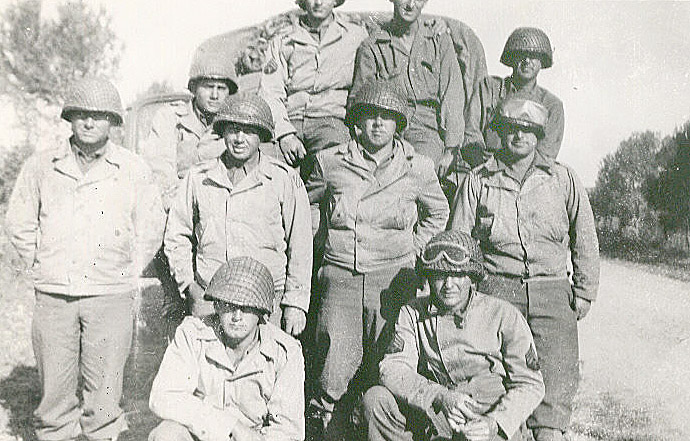
Audie Murphy (2nd from left,3nd row) posing with fellow
GI'sPhoto taken
by Capt. Hugh A. O'Neill, surgeon,
3rd Medical Battalion, 3rd Infantry Division
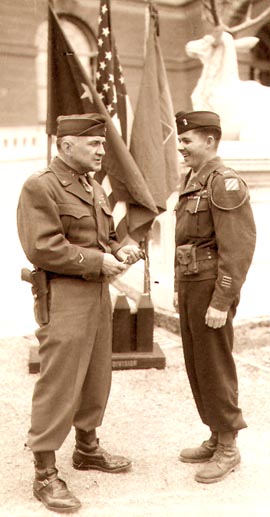
On March 5, 1945, 1st Lieutenant
Audie Murphy was called to Nancy, France by order of the 3rd Infantry Division Commander, Major General John "Iron-Mike"
O'Daniel. On this day, General O'Daniel presented to 1st Lieutenant Murphy the Distinguished Service Cross and Silver Star.
After 'Iron Mike" pinned the medals on Audie's uniform, he pulled out of his pocket a Medal of Honor. Without giving it to
Audie, O'Daniel showed the medal to him and stated that General Alexander Patch, the 7th Army Commander, would soon
pin it on Audie during a different ceremony.
|
 |
|
|
 |
|
|
 |
|
|
|
